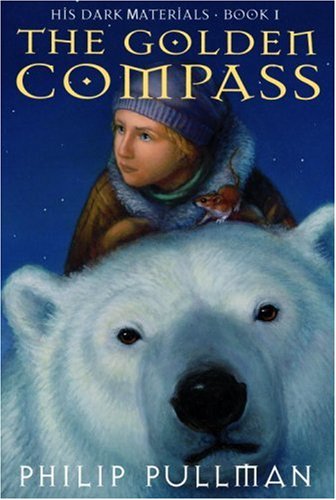
Pullman, Philip. The Golden Compass. New York: Random House, 1995. 399 pages.
The first installment in Pullman’s His Dark Materials trilogy, The Golden Compass introduces us to the adventures in store for eleven year old Lyra Belacqua. Lyra is an orphan under the care of the scholars of Jordan College in Oxford, England, but one quite different from our world. The people in Lyra’s world all possess daemons, animals that embody a certain part of the nature their human companion. Lyra lives a carefree and happy life playing on the streets of Oxford with the town’s children, and only has one living relative, Uncle Asriel, a man of great power and influence, but who is constantly away on explorations to solve important questions that Lyra doesn’t quite understand yet. At the beginning of the novel, we are immediately introduced to Lyra’s precocious nature as we find Lyra hiding in a cupboard in the office of the Master of Jordan College where she overhears a plot to poison Uncle Asriel. Lyra is able to intercede and prevent the death of her uncle, but a mysterious series of events follows. We follow Lyra’s adventures as she tries to sift through the layers of deception of the church, the pervading fear of The Gobblers, and the mysteries of the alethiometer.
This book brings readers on a journey that is so compelling that they will eagerly keep turning pages to find the answers to their questions, but even the end brings up only more questions. I’ve heard many times that this book and this series have been on lists of banned books, very likely because of the negative portrayal of the church. For me, it’s a little difficult to designate a specific age group for this novel. Lyra is 11 at the beginning of the novel, and this may be a misconception left over from believing some other myths about reading, but I’m hesitant to believe that Pullman really intended this book for teenagers, especially older teenagers like 16 or 17 year olds because the main character is only 11. An 11 year old character simply markets as being an accessible book for younger adolescents. But as I was reading I found that the language style is really quite sophisticated, and readers really need to be on point and aware while they are reading. At times even I felt a little confused, but I think that’s part of the draw of the book—it keeps you wondering, thinking, and postulating until the end, and even after.
In addition to the higher complexity of language, this story is essentially a coming-of-age tale and the battle between being a carefree child to a person of immense power. It also portrays grown ups in a less-than-perfect, at many times negative way (another reason why it may be banned for some), and Lyra and the readers come to the realization that grown ups are clearly not infallible. Some of the questions I thought of while reading included: How does destiny play a role in someone’s life? What makes someone special? What would life be for us if each person possessed a daemon like in Lyra’s world? All in all, I completely understood why this has come to be such a popular book for children and young adults. An attention-grabbing introduction to a trilogy, The Golden Compass paints a beautifully troubled world, and definitely one in which readers will definitely want to get lost.
No comments:
Post a Comment